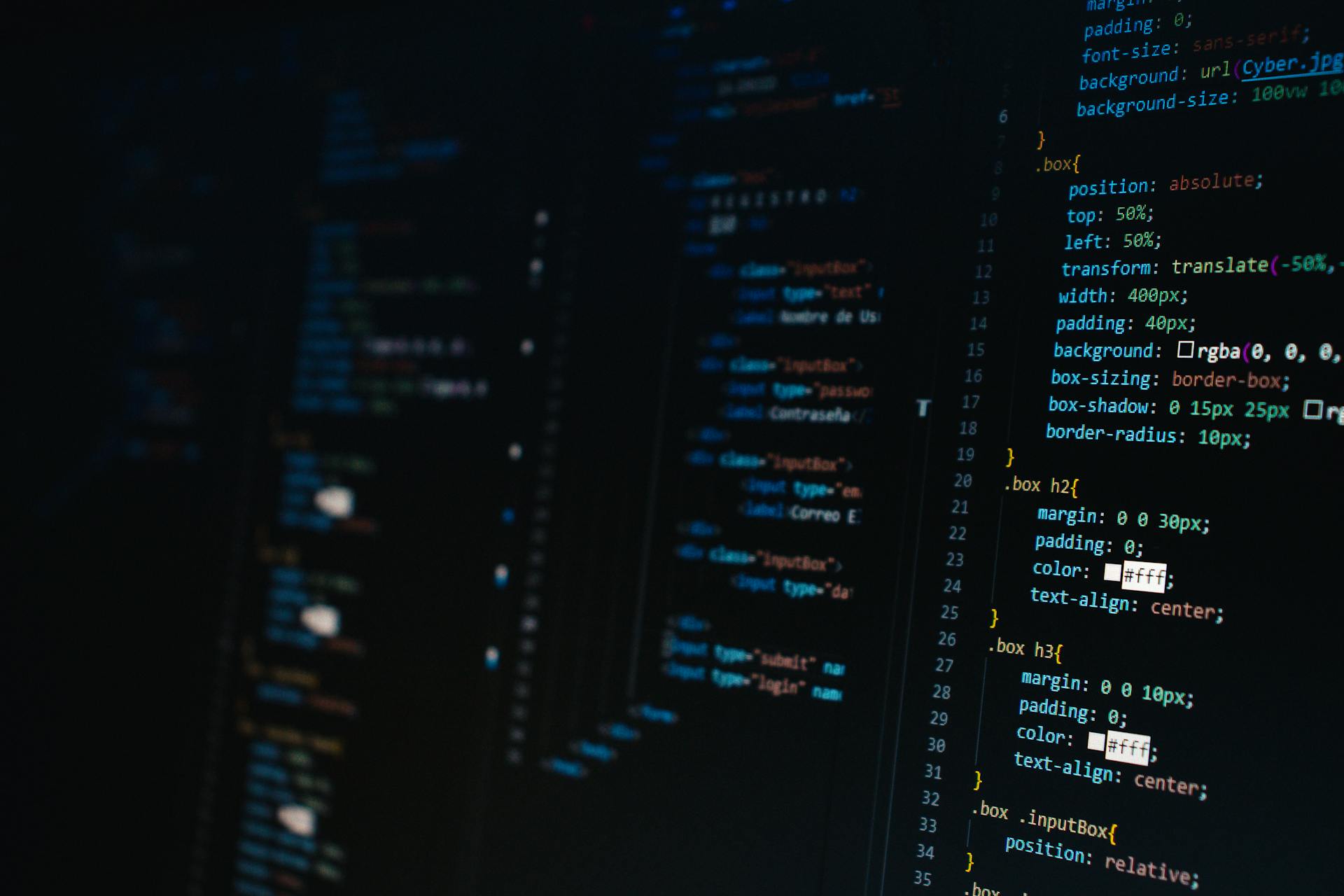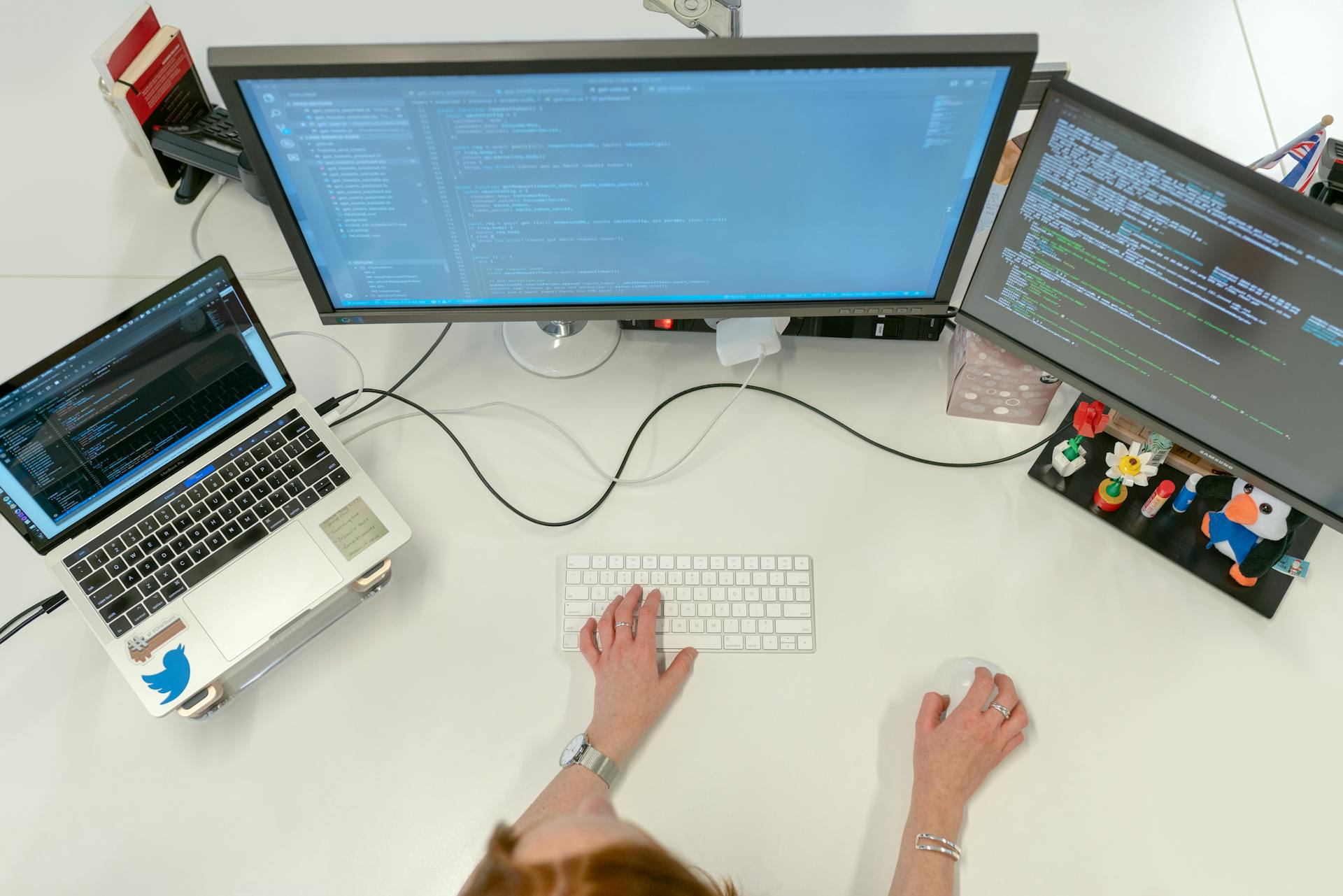
Learning to code Python for free is a great way to get started with programming without breaking the bank. You can start with online resources like Codecademy, which offers a comprehensive Python course with interactive exercises and quizzes.
Python is a versatile language with a wide range of applications, from data analysis to web development. With Codecademy, you can learn the basics of Python programming in just a few weeks.
One of the best things about Codecademy is that it's self-paced, so you can learn at your own speed. This is especially helpful if you're a beginner and need to take things one step at a time.
Related reading: Learn How to Code Google's Go Programming Language
Getting Started
You can learn Python for free through online courses, books, boot camps, and free guides. Udacity offers a beginner-friendly course on Python programming that covers key topics like data storage, conditionals, and loops.
This course is ideal for students who enjoy hands-on learning and diving into projects right away. You'll work at your own pace with interactive quizzes to keep you engaged.
Real Python also offers an example-based tutorial that's perfect for those who want to learn by doing. With plenty of resources available online, you can start learning Python quickly and easily.
Here's an interesting read: Learn Morse Code Online
What Is Python?
Python is a high-level programming language that's easy to read and write, making it perfect for beginners. It's a versatile language that can be used for a wide range of applications, from web development to data analysis.
Python was created in the late 1980s by Guido van Rossum, a Dutch computer programmer, and was first released in 1991. He wanted to create a language that was simple and intuitive, with a focus on readability.
Python's syntax is designed to be simple and consistent, with a focus on using whitespace to separate code blocks. This makes it easy to write and understand Python code, even for those with little programming experience.
Recommended read: What Is the Hardest Code Language to Learn
Introduction to Programming
Getting started with programming can be intimidating, but with the right resources, you can learn the basics quickly.
Udacity offers an introduction to Python programming course that's perfect for beginners, covering key topics like data storage, conditionals, and loops.
Interactive quizzes and a self-paced approach make learning fun and engaging.
Real Python's example-based tutorial is another great resource for learning Python by doing.
You can also learn basic Python programming through online courses, books, and free guides, but Dataquest is a highly recommended option that gets you up to speed fast.
Learning the basics quickly is essential to jumping into fun projects and exploring your creativity.
.org
Learn to code Python for free with online resources like LearnPython.org, which offers an interactive coding tutorial with a hands-on approach.
You can write your code as you go through the lessons on LearnPython.org, thanks to the little window at the bottom of the screen.
This interactive format makes learning Python a fun and engaging experience, perfect for beginners who want to learn by doing.
With LearnPython.org, you can learn to code Python without breaking the bank, making it an excellent choice for those on a budget.
Learning Paths
You can start learning to code Python with a beginner-friendly course that gets you coding quickly and helps you practice as you learn. This is a great way to get started and build your confidence.
Some good resources to help you learn the basics include the Introduction to Python Programming Course, Learn Python the Hard Way, and the Python Tutorial. These resources will walk you through the foundational concepts and get you off to a good start.
If you're interested in data science, you can start with free online courses and tutorials that don't require a computer science degree. A solid coding bootcamp education can be enough to get your foot in the door.
Here are some free coding courses and resources for complete beginners to get started:
- Codecademy
- freeCodeCamp
- SoloLearn
- MIT OpenCourseWare
Basic Syntax
Learning the basic syntax of Python is a crucial step in your coding journey. You'll want to spend as little time as possible on this phase, ideally no more than a month.
Here are some good resources to help you learn the Python basics without killing your motivation:
- Introduction to Python Programming Course — A beginner-friendly course that gets you coding quickly and helps you practice as you learn.
- Learn Python the Hard Way — A book that teaches Python concepts from the basics to more in-depth programs.
- Python Tutorial — A comprehensive tutorial that will walk you through the foundational concepts and get you off to a good start.
The sooner you can start working on projects, the faster you will learn. You can always refer back to the syntax later if necessary.
Top 10 Courses with Certificate
Learning Python is a great way to get into game development or software engineering, and Codecademy offers a course called "Analyze Data with Python" that includes a certification of completion for Pro account holders.
Codecademy gamifies the learning process, allowing you to move through interactive exercises and projects. You'll learn Python programming skills and use them to visualize and interpret data sets, like statistics.
If you're interested in data science, you don't need a degree to get started. A solid coding bootcamp education can be enough to get your foot in the door.
Codecademy's "Analyze Data with Python" course is a great resource to start your data science education, and it's free to try out.
Recommended read: Data Labeling in Machine Learning with Python
Scaler Certification Course
The Scaler Certification Course is a great resource for learning Python. It's a free course that's perfect for beginners and developers alike.
The course is designed to help you master Python essentials, including variables, data types, functions, loops, file handling, and more. You'll also get to progress to intermediate concepts like OOP and Exception Handling.
Scalers' certification course has an average rating of 4.90 out of 5, which is a testament to its effectiveness.
All candidates who complete the course receive certificates, which can be a great addition to your resume or online profiles.
Here are some key details about the course:
- Average Rating: 4.90 out of 5
- Certificates: All candidates get certificates on Completion of the course.
Google's Class
Google's Class is a two-day course designed for students with some programming language experience. It's an intense hands-on practice session that covers a wide range of topics, including strings and lists, working with text files, processes, and HTTP connections.
Each section includes a coding exercise that becomes increasingly complex as you progress through the course. No official prerequisites are required, but basic programming language concepts, such as if statements, are recommended.
The course is a great way to gain hands-on experience with Python and improve your skills in a short amount of time. With Google's guidance, you can learn Python quickly and efficiently.
Here are some key details about Google's Python Class:
- Duration: 2 days
- Focus: Hands-on practice
- Recommended prerequisites: Basic programming language concepts, such as if statements
Colleges and Universities Code
Colleges and universities are now offering free coding resources for those who want to learn without going to college.
You can fuel your desire to be a lifelong learner with in-demand, self-taught coding resources.
Many colleges and universities have made their coding resources available for free, giving you the college experience without the cost.
You can learn to code for free via colleges and universities, allowing you to start your coding journey without breaking the bank.
This is a great option for those who want to learn at their own pace and on their own schedule.
Broaden your view: How to Learn to Code on Your Own
Django Girls CLI Introduction
Django Girls offers a free one-day coding workshop on Python and Django, which includes a free command line tutorial.
Recommended read: Automated Machine Learning with Microsoft Azure Pdf Free Download
Their tutorial is designed to get you up and running with the command line on Windows, OS X, and Linux.
You can visit Django Girls' Command Line Tutorial for more information.
The tutorial is accompanied by YouTube video tutorials that provide a visual learning experience.
You can also visit Command Line Power User for additional resources.
Relevance Beyond Data Science
Python is used professionally in a wide variety of contexts, including finance, web development, software engineering, and game development.
You can apply your Python skills to a job that involves working with spreadsheets, where you could be doing things faster and better with Python.
Python is a popular and flexible language that's used in many areas beyond data science and machine learning.
Having some data analysis skills with Python can be useful for various other jobs, and learning data skills 10x faster is a great advantage.
Intriguing read: Data Labeling in Machine Learning with Python Pdf
Learning by Doing
Learning by Doing is a crucial part of the coding process. Coderbyte teaches you the basics of popular programming languages by letting you build up your new skills using their library of 300+ coding challenges and solutions.
You can start with free coding challenges in languages like JavaScript, Ruby, Python, HTML, CSS, Node.js, and more. Codecademy gamifies the process of learning to code, allowing you to move through interactive exercises and projects.
To take your skills to the next level, try working on independent projects like tracking your daily walks with an app, sending weather notifications, or creating a real-time, location-based chat. Start with small projects and gradually increase the difficulty and scope as you become more comfortable.
Edabit
Edabit is a great resource for learning to code, with bite-sized challenges that simulate real-world programming. It's like having a coding coach in your pocket.
Edabit's challenges cover a wide range of programming languages, including Java, JavaScript, PHP, Python, C#, C++, Ruby, and Swift. You can learn at your own pace, fitting it into your daily routine.
Edabit's approach makes coding fun and accessible, even for newbies. It's a great way to build momentum and stay motivated.
Analyze Data
Learning to analyze data is a crucial part of coding, and there are many resources available to help you get started.
Codecademy's "Analyze Data with Python" course allows you to visualize and interpret data sets, like statistics, and even run A/B tests on real-world business examples.
Dataquest teaches you Python and data science interactively by analyzing interesting datasets, such as CIA documents and NBA player stats.
You can also use Scikit-learn Documentation, the main Python machine learning library, which has great documentation and tutorials to help you get started.
Harvard's CS109 class teaches Python for data science and has some of their projects and other materials online, making it a great resource for learning.
Here are some popular resources for learning data analysis:
- Dataquest
- Scikit-learn Documentation
- CS109 (Harvard's Python for data science class)
Automate Tasks
You can automate tasks independently with Python, which is incredibly powerful because your time is valuable. Let the robots send your emails and fetch data from the internet.
Python is a versatile programming language that allows you to work with massive datasets easily. You can scrape data from the web and access APIs, use it to power-up your work in Excel, and automate all sorts of tasks.
Learning to automate tasks can be incredibly powerful. You'll be able to find creative solutions for the people and companies you work for.
Here are some examples of tasks you can automate with Python:
- Automate data entry
- Scrape data from the web
By automating tasks, you'll be able to free up time to focus on more important things, like building your skills and creating new projects.
Tips and Motivation
Finding your motivation is key to learning Python. It's a game-changer when you're excited about what you're working on.
Identify what drives you, whether it's building a project or solving a problem. I found myself staying up all night to finish a project when I was motivated by its potential.
To get started, find one or two areas that interest you: Data Science / Machine learningMobile AppsWebsitesComputer ScienceGamesData Processing and AnalysisHardware / Sensors / RobotsAutomating Work Tasks
Identify Your Motivators
To get started with Python, find one or two areas that interest you. You need to find what motivates you and get excited about it!
As a beginner, I struggled to keep myself awake when trying to memorize syntax. However, when I needed to apply Python fundamentals to build an interesting project, I happily stayed up all night to finish it.
Finding your motivation is key to becoming proficient in Python programming. With the right motivation, anyone can become highly proficient.
Here are some areas that can get you excited about Python:
- Data Science / Machine learning
- Mobile Apps
- Websites
- Computer Science
- Games
- Data Processing and Analysis
- Hardware / Sensors / Robots
- Automating Work Tasks
Tips
Set realistic goals for yourself. Research shows that people who set specific, achievable goals are more likely to succeed.
Break down large tasks into smaller, manageable steps. This will help you stay focused and motivated, especially when working on complex projects.
Use positive self-talk to boost your confidence. Studies have shown that people who use positive affirmations tend to perform better and feel more confident.
Create a schedule and stick to it. By prioritizing your tasks and managing your time effectively, you'll be able to complete your goals and feel a sense of accomplishment.
Practice self-care to avoid burnout. Taking care of your physical and mental health is essential for maintaining motivation and productivity.
Celebrate your successes, no matter how small they may seem. Recognizing your achievements will help you stay motivated and encouraged to continue working towards your goals.
Broaden your view: Books to Help Learn Code in Java
Why Should I?
Setting goals is a crucial part of achieving success, but it's easy to get stuck in the planning phase.
In fact, research shows that people who write down their goals are 42% more likely to achieve them. This is because putting your goals in writing helps you clarify what you want to achieve and creates a sense of accountability.
You don't have to be a morning person to be productive, but having a consistent routine can make a big difference. A study found that people who exercised in the morning were more likely to stick to their workout routine, even on weekends.
Breaking down big tasks into smaller ones can make them feel less overwhelming. This is known as the "2-minute rule", where you ask yourself if a task can be done in less than 2 minutes. If the answer is yes, do it immediately.
Having a support system can make a huge difference in your motivation. Surrounding yourself with people who believe in you and your abilities can help you stay on track.
It's okay to make mistakes and learn from them. In fact, research shows that people who view failures as opportunities for growth are more likely to achieve their goals.
How Long Does It Take?
Learning a new skill like Python can be intimidating, but the good news is that it's probably less time-consuming than you think. Learning the Python basics may only take a few weeks, but becoming job-ready as a programmer or data scientist can take four to twelve months.
The amount of time it takes to learn Python depends on your goals and how you approach it. For example, if you're a marketer who wants to analyze Google Analytics data, you can learn the necessary Python skills in a matter of weeks.
Here are some general guidelines to keep in mind:
- A marketer who wants to analyze Google Analytics data can learn fundamental Python syntax and pandas techniques in a matter of weeks.
- A beginner seeking a new career in data science can expect to spend at least a few months studying part-time, with most learners taking at least three months to complete a Data Analyst in Python career path.
- Exploring a career in web development or software engineering can be learned in weeks, with a focus on Python fundamentals tailored for web development.
Remember, while it may take a few months to become job-ready, it's a continuous learning process, and you can always improve and grow as a programmer or data scientist over the course of your career.
Advanced Topics
Learning to code in Python is an exciting journey, and as you progress, you'll encounter more advanced topics.
You can use functions to organize your code and make it reusable, as seen in the "Functions" section, where we created a simple calculator using a function to add two numbers.
One of the most powerful concepts in Python is object-oriented programming, which allows you to create reusable code by defining classes and objects, as demonstrated in the "Classes and Objects" section.
By mastering these advanced topics, you'll be able to write more efficient and effective code, and take your Python skills to the next level.
Version Control
Version control is a system for collaborating on code that makes it easy to tell who's working on what, identify broken code, and roll back changes.
Multiple developers can pull, edit, and add code to a shared repository using version control tools like Git and GitHub.
Version control systems like Git and GitHub can help you learn one of the most common version control systems out there.
You can learn version control for free by visiting GitHub Learning Lab.
On a similar theme: Learning Systems in Machine Learning
QA / Unit Testing
QA / Unit Testing is a crucial part of any software development process. It helps ensure that individual units of code are working correctly before integrating them into a larger project.
You can write unit tests to verify the behavior of a single function or method, using frameworks like JUnit or PyUnit. These tests are usually short and focused on a specific piece of code.
One way to write unit tests is to use the Arrange-Act-Assert pattern, which involves setting up the test environment, performing the action being tested, and verifying the expected outcome. This pattern can be applied to both simple and complex tests.
Mocking dependencies is also a common technique in unit testing, allowing you to isolate the unit under test and focus on its behavior without worrying about external factors. This can be achieved using libraries like Mockito or Moq.
In some cases, you may need to test code that interacts with external systems, such as databases or APIs. This requires using integration tests, which test how different components work together.
Career Opportunities
Learning to code in Python can open doors to a wide range of career opportunities. You can become a Python Developer, a career that's in high demand.
With Python skills, you can work as a Data Analyst, helping businesses make sense of their data and make informed decisions. Data Analysts are a crucial part of any organization.
You can also pursue a career as a Data Scientist, using Python to analyze complex data sets and uncover insights. This role is highly sought after in the industry.
Data Engineers are another career path you can take, using Python to design and build large-scale data systems. This role requires a strong understanding of data and technology.
Business Analysts can also benefit from Python skills, using the language to analyze data and make recommendations to stakeholders. This role requires strong communication and analytical skills.
Machine Learning Engineers use Python to build and train AI models, and this career is on the rise. If you're interested in AI, this could be a great career path for you.
Here's a list of careers you can pursue with Python skills:
- Python Developer
- Data Analyst
- Data Scientist
- Data Engineer
- Business Analyst
- Machine Learning Engineer
- Software Engineer
Featured Images: pexels.com


